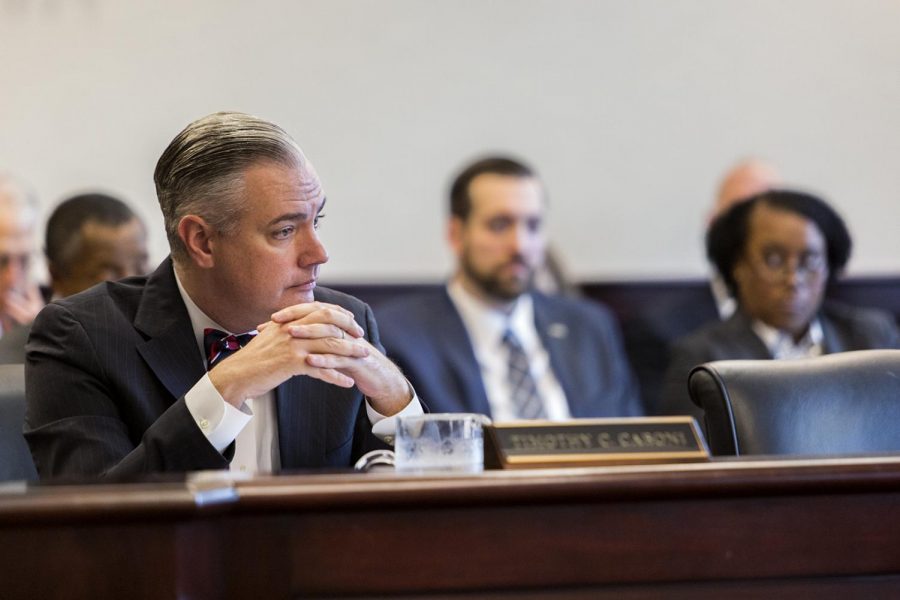Position eliminations trim $5 million in salaries from WKU budget
March 20, 2018
WKU has eliminated 119 full-time positions and one part-time position across the university, President Timothy Caboni announced on Monday.
Of the full-time positions eliminated, 62 were filled at the time of elimination and 57 were vacant. There are 2,100 full-time university employees.
Among the filled full-time positions eliminated were the chief enrollment officer and the regional chancellors for WKU’s Elizabethtown/Fort Knox and Owensboro campuses, as well as the regional vice chancellor for the Glasgow campus.
Five vacant professor positions were eliminated, as well as five vacant associate professor positions and seven vacant assistant professor positions. No filled professor, associate professor or assistant professor positions were eliminated, according to the information provided by WKU.
The part-time position eliminated was the NCAA academic compliance coordinator, which was filled at the time of elimination.
The College Heights Herald requested information about position eliminations, including position title, the department the position was in and how long each faculty or staff member was employed by the university on Wednesday, March 7. The information was released shortly after 3:30 p.m. on Monday, March 19.
According to documents given to the Herald by WKU director of media relations Bob Skipper, the total budgeted salaries of the vacant and filled positions amount to over $5 million.
In his email, Caboni said the reductions “reflect that WKU is a smaller institution than we were five to ten years ago.”
“While difficult, these decisions were necessary to move us toward a more stable institutional budget that matches the revenues we generate each year,” Caboni said. “Unfortunately, our work in this area will continue once the Kentucky General Assembly completes their work. Decisions regarding our state appropriation and pension obligations will have further budgetary implications for us. The steps we take now will allow us to restructure operations to meet our immediate needs and are designed to ensure future budgets are more stable, predictable and support our core missions.”
Departments informed those whose positions were being eliminated in meetings and through emails, which informed them not to report to work or instructed them to meet with Human Resources in Downing Student Union to pick up their packets.
Caboni also said that “we must continue to reimagine and redefine our institution as we move forward together.”
“As part of our strategic planning process, we will think creatively about our organizational arrangements and investments; we will support efforts to recruit, retain and graduate students; we will define how an applied research university creates knowledge that elevates our region; we will demonstrate how the WKU experience differentiates us in the marketplace; and we will position ourselves for the next decade of successes,” Caboni said.
A full list of positions eliminated, including the department and division within the university from which they were eliminated, is available on the Herald website.
Academic affairs had 68 positions eliminated, the highest of any division at WKU. Information technology had the next highest, at 12 positions eliminated. Finance and Administration had 8 positions eliminated. The chief facilities officer, chief international officer, philanthropy and alumni engagement and student affairs each had 7 positions eliminated. Public affairs had two positions eliminated, and the divisions of athletics and the president each had one position eliminated.
These eliminations come as the university was recommended by the Budget Council to reduce the university’s workforce. Originally, Caboni had accepted the council’s recommendation to eliminate 40 vacant positions and to terminate 90 to 100 already filled positions.
The Budget Council did not recommend which specific positions should be terminated. Caboni said the decision would fall on the vice presidents and deans. WKU will pay terminated employees through June 30.
“This has nothing to do with talent,” Caboni said during a press conference following the Feb. 23 Board of Regents meeting. “It has everything to do with resources.”
At the press conference, Caboni said WKU will continue to provide support to those individuals who will lose their jobs. He said human resources is ready to “wrap its arms around folks and support them” through the technical aspects of finding a new job.
Of the 120 positions eliminated, 16 came from WKU’s three regional campuses. WKU will be returning its regional campuses, Glasgow, Owensboro and Elizabethtown-Fort Knox, to the management of the Division of Extended Learning and Outreach (DELO).
One of those positions included Elizabethtown/Fort Knox regional chancellor, Evelyn Ellis, who had previously confirmed with the Herald that her job had been eliminated on March 9.
“I’ve enjoyed my time at Western Kentucky University and have had the privilege of working with the wonderful staff at Elizabethtown,” Ellis said.
Ellis said her release date as chancellor is March 30, which means that is the last day she will have the responsibilities as chancellor.
At that point, she said, DELO will take over management.
WKU’s deficit stems from a decrease in enrollment and state funding in the past few years. The deficit is expected to continue to grow this year. Gov. Matt Bevin has proposed a 6.25 percent cut to state funding. If approved, WKU could lose $4.6 million.
Earlier this year, Caboni said WKU could have a budget deficit as large as $40 million. The $40 million comes from our $15 million deficit, the anticipated $4.6 million cut, WKU’s nearly $9 million pension obligation and an anticipated $10 million deficit from enrollment changes and fixed costs. Additionally, WKU may also lose $750,000 if Bevin’s proposal to eliminate the Kentucky Mesonet, a statewide weather and climate monitoring system, is approved.
Caboni has said more cuts can be expected after the legislature releases Kentucky’s final budget model in April.
A previous version of this story listed the eliminated position of the director of the office of sponsored programs as filled at the time of elimination. The position was vacant at the time of elimination. The Herald regrets the error.


























